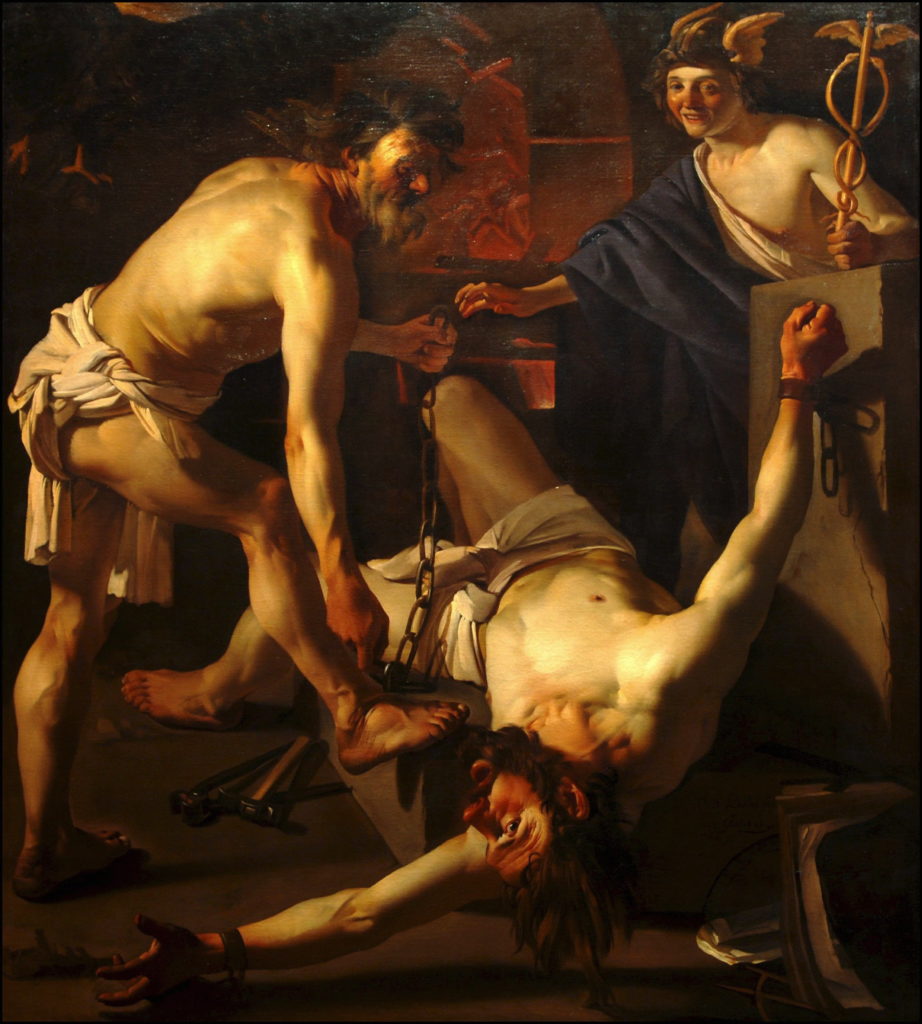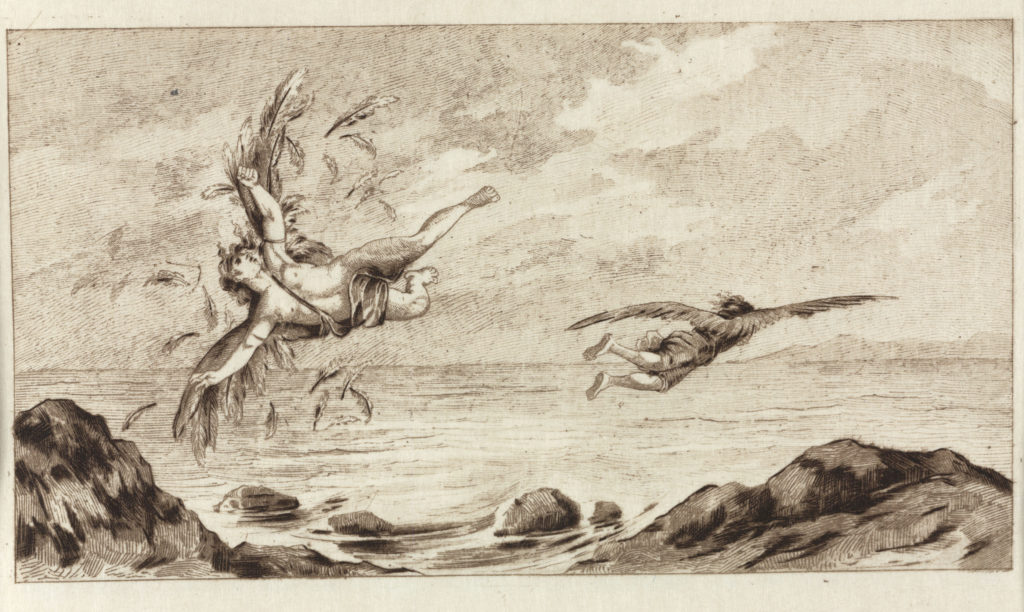
Ruth Padel
Prometheus and Stolen Fire, Unbound, May 2018
An invisible grammar of Greek myth underpins traditional Western assumptions about human behaviour. It is knitted into our stories and our languages. We may not be aware of its details but we follow it, unconsciously. The way it works in us is both multiple and latent, like the syntax of a complex wine. We assume sex and violence go together because (well, at some level because) Venus and the war-god are lovers. Music brings people together: Orpheus draws everyone to him. Love is blind, we see it in our friends if not ourselves, and so is Cupid.
Today, with so many assumptions being shipwrecked by a changing world, Greek myths are having a Renaissance. With new voicings of Circe, the Argonauts, Penelope, the Iliad, writers are asking new questions about old self-myths, looking for new clarities in the floating connections on which we base our lives. Last week in New York, I heard Colm Tóibín and Kamila Shamsie talk about their latest novels, House of Names and Home Fire respectively, which re-work Orestes and Antigone. I also watched the first performance of Tóibín ’s brilliant new play, Pale Sister, a monologue for Antigone’s sister, voiced by the Beckett actress, Lisa Dwan.
Many myths focus, like those, on family or sexual relations. But, though you have to explore a forest of connecting stories to see its full force, the one about the origin of fire has special resonance today. Most cultures with a story to tell about fire’s origin see it as a theft. Fire is stolen, from someone who does not want to share it. Sometimes by a bird or animal blazoned with red because the fire left a scar.
In ancient Greece, fire was stolen by Prometheus, whose punishment by Zeus, ruler of the gods, was worse than a scorch-mark and has mesmerised the imagination of philosophers, painters and poets ever since. Prometheus is the archetypal figure of revolutionary defiance, chained to a rock with an eagle eating his liver, which regenerates only to be eaten again the next day. ‘Fire’ is also ‘life’. In one story, Prometheus not only gave human beings fire, and therefore civilisation, but created them. Hence Mary Shelley’s subtitle, Frankenstein: A Modern Prometheus. Before Othello kills Desdemona, he compares her to a candle which he can re-light. For her, ‘I know not where is that Promethean heat/ That can thy light relume’.
Misogyny, the origin of human suffering, mistrustful relations between divinity and humanity, and possibly the ambiguous nature of hope, all came into the story of fire
Why have people always felt that fire was stolen? There’s a simple material explanation: earth, water and air, the other traditional elements of the world, are around us all the time but fire must be coaxed out of wood and stone, unless it comes down as lightning, as divine fire. Fire also needs special knowledge. You have to learn to kindle and nurture it, so it won’t go out, the secret won’t be lost. But the larger moral and political implications aspects of the theft were first explored in the Greek tragedy, Prometheus Bound, whose author was traditionally taken to be Aeschylus, the oldest tragic poet whose plays survive. The language is slightly later than his day so it may not be actually his, but whoever wrote it was a genius, and influenced by Aeschylus, so we may as well say it was Aeschylus and be done. It was the first play of a trilogy. The others are lost, but we know that in the next, Prometheus Unbound, Heracles kills the eagle and frees Prometheus; and in the third, Prometheus Fire-Bringer, Prometheus is reconciled with Zeus.
The original audience knew the myth from the eighth–seventh century BC poet Hesiod. In his epic poem, Birth of the Gods, Prometheus was one of the second generation of divine beings: the Titans, children of Heaven (Ouranos) and Earth (Gaia). Prometheus, whose name means ‘Forethought’, decided how humans should sacrifice to gods. He presented Zeus with a small pile of beef, hidden in an ox’s stomach, and a large pile of bones wrapped in ‘glistening fat’. Zeus chose the larger: that is why humans keep the meat of a sacrifice for themselves and sacrifice bones to the gods. Furious at the trick, Zeus hid fire; Prometheus stole it back and gave it to men. In revenge, Zeus sent men a woman created by Hephaestus, the craftsman god, and adorned by goddesses.
‘From her is the deadly race of women, who live among mortal men.’ In another poem, Works and Days, Hesiod tells it differently. Zeus, because Prometheus tricked him, withholds the ‘means of life’ from men. He hides fire. Prometheus steals it back, warning his duller brother, Epimetheus (meaning ‘Afterthought’), not to accept any gift from the gods. But his brother cannot refuse the gift of a woman: Pandora, named ‘All Gifts’, because all gods gave her gifts like beauty and desirability. Pandora brought a jar with her. When she opened it, out flew the ‘ills’ men have to suffer, like pain and disease. She shut the lid too late to stop them, but Hope remained in the jar. Hesiod does not say whether Hope was one of the ‘ills,’ or the only good thing in the jar.
So misogyny, the origin of human suffering, mistrustful relations between divinity and humanity, and possibly the ambiguous nature of hope, all came into the story of fire. Aeschylus re-works them, and links them to basic ethical questions of tyranny, justice, freedom, defiance and revolution. (This was Karl Marx’s favourite play.) Aeschylus also turns the misogyny on its head, bringing on stage a woman’s life and body wrecked by sexual harassment.
Io’s role in the play has particularly appealed to women writers: Elizabeth Barret Browning translated the play twice, first in 1833, and at least six women in Britain and America have translated it since. Io is no Pandora, bringing suffering to men. She is another victim of Zeus, and a mirror to Prometheus.Io was the daughter of a priest. Zeus’s seduction and pursuit of her began in dreams, telling her he was enflamed with desire. When her father hears of this, he turned her out of the house: anxious, as in classic patriarchy, not to offend power. Zeus, trying to slip under the jealous radar of his consort Hera, transforms Io into a cow, so Hera sends a gadfly to madden and sting her. Io enters the play as a ‘horned maid’, driven by bursts of biting frenzy to wander over continents. Zeus damages both their bodies. One is chained to a rock in agonised stillness. The other is a cow, all agonised mobility.
The Cyclopes invented fire, raised city walls and forged Poseidon’s trident. They were builders and smiths. It was they who gave Zeus the thunderbolt and lightning
Io’s story is of a daughter betrayed by her father; Prometheus belongs with sons usurping a father. The play begins as Zeus consolidates world-rule after winning a cosmic war against the Titans, led by his own father Cronos (or Saturn). Cronos himself took power from his father Ouranos (or Heaven). As Hesiod tells it, mother Gaia (Earth) was angry when Ouranos imprisoned their youngest children, the Cyclopes, in Tartarus, the deepest part of the underworld. From within herself, Gaia created a stone sickle and gave it to her son Cronos. When Ouranos spread himself on Gaia, ‘bringing on night and longing for love’, Cronos cut off his testicles, threw them into the sea, took over world-rule, re-imprisoned the Cyclopes (Gaia seems not to have minded), married his sister Rhea, and ruled over the Golden Age, when there was no crime and no need for law.
One of the paradoxes of history, or of the psyche: the age we look back to nostalgically as Golden, began with a horrible crime. It continues with one, too. Cronos knew he was fated to be overcome by his sons so he ate most of his children. Rhea tricked him into eating a stone instead of baby Zeus, who grew up, forced his father to disgorge his siblings, and released the Cyclopes.
This is where fire enters the story. The Cyclopes invented fire, raised city walls and forged Poseidon’s trident. They were builders and smiths. It was they who gave Zeus the thunderbolt and lightning, the weapons with which he defeated the Titans. Fire is the weapon which wins a war.
Aeschylus reworks this story too. His Prometheus claims it was he who helped Zeus win world power. No mention of the Cyclopes: Prometheus insisted to his brother Titans that the battle would be won by intelligence, not force, but they ignored him. So he changed sides and helped Zeus. After that he ‘saved’ mortals, which is why he is suffering. Into this account, Aeschylus re-works the original motifs of hope, pain, disease and fire – which enables technical invention, and is shorthand for civilisation. ‘Every techne they possess,’ he says (the word techne can mean art, science, craft, any knowledge of how to do something), ‘comes from Prometheus.’ He also gave humanity reason, domesticated animals, invented ships, taught them maths, medicine, mining, house-building, how to read the stars for a farming calendar, how to write. Before him, ‘they had eyes but didn’t see, had ears but didn’t understand.’
He also says he stopped them foreseeing their death. ‘What medicine,’ asks the chorus, ‘did you discover for that disease?’ ‘I planted blind hopes in them,’ he replies. ‘What a great benefit you gave,’ they say. (Given that ambiguity around Hope in Pandora’s jar, I have always wondered if this is ironic.) ‘I also gave them fire,’ he says, ‘and from that they will learn many technai.’
Prometheus makes these spectacular claims from a position of utter physical vulnerability. The play will end with Zeus punishing him further still, plunging him down, like the Cyclopes, to Tartarus. The play is all about power, and its first speaker is Power personified: Kratos, accompanied by power’s eternal silent henchman Bia, Violence or Force. It opens with Prometheus under arrest at the edge of the earth, in the ‘untrodden loneliness’ of the Caucasus (where you can find Eagle Rock, or the Rock of Prometheus, above Sochi). He is marched in by Kratos, Bia and accompanied by the divine smith, Hephaestus (or Vulcan), the god of metal-working.
There are obvious reasons for the presence of Power and Violence, but also for Hephaestus. He has the expertise to chain Prometheus to the rock, he is god of fire and works with fire, and he too suffered a questionably just divine punishment. He was thrown out of heaven – either as a baby by his mother, Hera, disgusted that he was born lame (after which he fell into the sea and was raised by sea goddesses), or by Zeus, because Hephaestus defended Hera against him. In this version, Hephaestus fell for a day and landed on Lemnos, an island associated with ‘Lemnian fire’ (possibly flames of natural gas), where he learned to be a smith. His history, as the only god to return from exile to Olympus, seems to reflect the hiding and return of fire itself.

The chaining process is torture, and very graphic. Hephaestus hates making a fellow immortal suffer, but has to obey Zeus; Kratos reminds him that Prometheus’s crime affects him most. ‘He stole your flower and gave it to mortals. That arm’s fixed, now do the other, so he understands that Zeus is stronger. Bash a jaw of steel through his chest.’
‘Forgive me,’ Hephaestus groans, as he skewers Prometheus to the cliff. ‘Every ruler’s harsh when he is new.’ But Kratos gloats. ‘Now try and insult us, steal divine privilege and dish it out to mortals!’
After they go, Prometheus hears wings. ‘The air whispers with wings, everything coming at me is frightening.’ The audience expects the eagle: what they get is a chorus of girls. The daughters of Oceanus are landing in winged cars, a brilliant chorus to put beside a tortured hero. They are fluttery, compassionate and – like the sea goddesses who rescued Hephaestus – are water to his fire. ‘Don’t be afraid,’ they sing, ‘we come as friends. Getting our father’s hard-won consent, we flew here to find you.’ Like Job, and Samson Agonistes, Prometheus is a fixture. His drama will be a sequence of visitors and they are the first. They will also become collateral damage in the struggle with Zeus, for at the end they choose to go down to Tartarus with Prometheus.
The plot turns on the reason for that further punishment. Even in chains, Prometheus is defiant. And he has a private weapon: he knows a secret that could bring Zeus down. Zeus is pursuing another sexual conquest, but of someone fated to bear a son stronger than his father. So Zeus could be deposed just as he deposed his father; and so did his father, before him. Zeus, who can overhear everything, wants to know who this female is. Prometheus won’t tell.
The story is a treasure trove of symbolism, refracting countless meanings of fire, as love, lust, spirit, life, passion, art, imagination, freedom, revolution and – firing the mind – creativity
Prometheus’s male visitors are self-seekers. The girls’ father, Oceanus, urges him to tell his secret, and offers to intercede with Zeus. Prometheus sends him packing. At the end, Zeus’s unpleasant messenger, Hermes, warns Prometheus that if he doesn’t tell, he’ll go to Tartarus. He refuses, and earth opens. But the female visitors are on his side. The Oceanids, appalled at his suffering, share his fate. Io mirrors his suffering, and their destinies are intertwined. Prometheus prophesies the end of Io’s ordeal when Zeus impregnates her, and makes her sane, simply by touch. Heracles, who will release Prometheus, will be a descendant of her son Epaphus (‘Touched’).
So hope exists. Both will one day find release from pain. We know that in the third play, Prometheus makes peace with Zeus, reveals the dangerous woman’s identity (Thetis, a sea-nymph whom the gods will marry off to a mortal, to whom she will bear Achilles), and gets an annual torch-race at Athens set up in his honour.
The story is a treasure trove of symbolism, refracting countless meanings of fire, as love, lust, spirit, life, passion, art, imagination, freedom, revolution and – firing the mind – creativity. Fire as God, knowledge, truth, glow of divine comfort, or blaze of divine fury. Fire as source of warmth, light, culture, nourishment (‘calories’), technology, invention and science, but also the firing squad. Fire can purify, regenerate and destroy. The symbolism ranges from sexual (flame is vertical, rises from a spark, is created by rubbing), to theological: humanity gets something forbidden and divine, like the fruit in Genesis, another creation story.
You can read the symbolism psychologically too: it could be the story of fantasies behind rebellious adolescence. We feel helplessly vulnerable to the unjust way the world is run. A world ruler, a father, a president with a history of brutality keeps us oppressed. Anyone who tries to help is punished. But we do have fire, have hope that our secret knowledge will bring him down in the end.
Painters have loved exploring the visual potential of all this. Most focus on three moments: Prometheus brandishing fire, chained by Hephaestus, or attacked by the eagle. Rubens’s panel in the Prado, of Prometheus stealing fire (1636), is the picture of guilt, looking over his shoulder as he dives for earth with his torch. But in the seventeenth century, artists developing a newly somatic sense of the Crucifixion were interested in portraying extreme pain, and so often portray agonised Prometheus in positions similar to Christ.

Intellectually, Prometheus and fire stand for new things in each generation. In the Renaissance, it is all spiritual. A fourteenth-century philosopher, Giovanni Boccaccio, says Prometheus ‘steals a ray of divine wisdom from God, source of all Science, supreme Light of every man.’ In the fifteenth century, Marsilio Ficino reads Prometheus as the human soul looking for truth. ‘Having stolen one beam of celestial light, the soul feels in chains. Only death can release her bonds and carry her to the source of all knowledge.’ For Romantic poets, increasingly inspired by French and American revolution, Prometheus is the rebel against tyranny, and stands for the progress of civilisation through revolution, scientific, political, or spiritual. Goethe’s Prometheus (1772) rebels against God, Byron’s (1816) is political and in Shelley’s Prometheus Unbound – written in 1820, two years after Mary Shelley wrote her Modern Prometheus – Prometheus is not reconciled with Zeus. Instead, Zeus himself loses power.
People have found Promethean similarities with not only Christ but Satan. In Renaissance pictures of Archangel Michael defeating Satan, you see the same spread torso falling back, as the spear, or eagle’s beak, goes in. Satan’s ‘fall’ from heaven echoes other fiery Greek falls: Hephaestus, yes, but also Icarus and Phaethon, both damaged by the sun. One flies too near on wings cemented with wax, the other fails to control the Sun’s chariot. All three echo the down-rush of the Fire-Bringer. Prometheus and Satan both bring light. Satan is even called Lucifer, Light-Bearer. In a book on Milton’s Satan, Lucifer and Prometheus, a scholar of religion called Zwi Werblowsky argued that in the tradition which saw Christian allegory everywhere in Greek mythology, Prometheus resembled Christ and Satan.
And so to the twentieth century – and the twenty-first. In Ridley Scott’s science fiction movie Prometheus (2012), the crew of the spaceship Prometheus look for the origins of humanity and discover a threat that might trigger its extinction. Beyond the aliens theme, the film is interested not only in monsters, but in who created them, and why; and whether our species is just as destructive. While Jared Hickman’s book Black Prometheus (2016) looks backwards, at the modern revival and reinvention of Prometheus across genres from slave narratives to Romantic poetry and Marx, and re-reads the reception of the myth in terms of an eighteenth- and nineteenth-century attempt to validate white domination over black slave revolt. But it is particularly since the splitting of the atom, that we have recognised the myth’s resonance for a nuclear age.

Performances of Prometheus Bound shot up worldwide after Hiroshima. Nuclear fission is Promethean fire; Robert Oppenheimer is the American Prometheus. A book about the history of the research, describing officials who did not understand the dangers giving scientists free rein, is called The Prometheus Bomb. Its subtitle, The Manhattan Project and Government in the Dark, reflects the links Aeschylus brings out between the theft of fire and questions of knowledge, secrecy and power.
Any gift that has been stolen carries a freight of risk, violence and guilt. There will be conflict about it, in the world or in the self. For above all fire is power. A moral question mark hangs over the basis of civilisation. We have a knowledge, and a power, we weren’t supposed to have. And we do not know its cost.